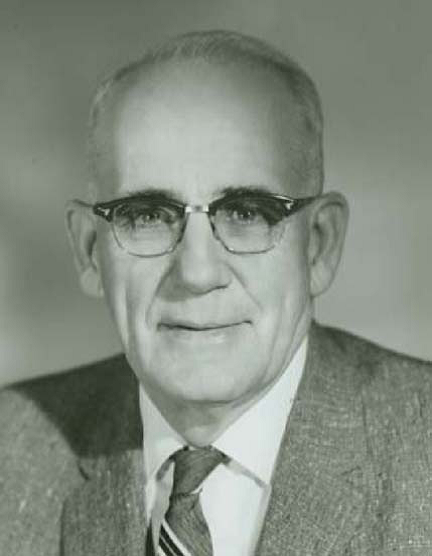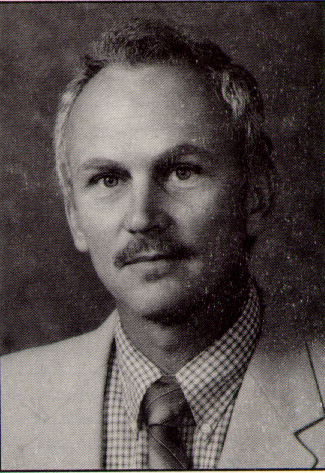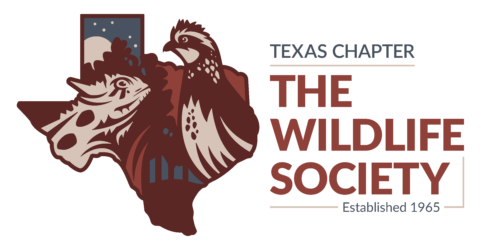No awards programs will be printed. Please use pdf linked below.
AWARDS PROGRAM 2019
Clarence Cottam, born in St. George, Utah, spent most of his first 30 years in his home state. Cottam spent 25 years with the U.S. Fish and Wildlife Service, serving finally as Assistant Director of U.S. Fish and Wildlife Service. He worked with waterfowl issues throughout the U.S., Canada, and Mexico, and was a strong voice in conservation issues involving environmental pollution, including pesticide problems. He was a charter member of The Wildlife Society, served as its President (1949-50), and received the Aldo Leopold Award (1955). His favorite associations were with the Ding Darling Foundation and the Rachel Carson Trust. He authored, co-authored, or edited over 250 publications, primarily in the area of ornithology. Cottam’s persona can best be described as that of contagious enthusiasm. He was always ready to confront controversial issues, particularly those involving the public interest. He expended much energy, time, and personal finances helping students and young people through problem periods. He never spared himself when faced with requests for assistance on behalf of conservation issues. He frequently expressed his political philosophy that “Democrats and Republicans were the primary threats to our wildlife resources”. Cottam was a gentleman’s gentleman, polite, caring, and respectful of his fellow man. He had a positive attitude, and was always jovial. He never cursed, but had a habit of verbally spelling out D-A-M at matters that disagreed with him. Frequently, friends or acquaintances would call to let him know that they were in the general vicinity of the Coastal Bend; he would politely invite them to come visit the refuge, then put down the phone and exclaim, “D-A-M”. He was a devout member of the L.D.S. (Mormon) Church, and for several years served as President of the Corpus Christi Stake (regional administrative unit). Cottam’s faith required that he abstain from alcohol, coffee, and tobacco, yet he never admonished those about him who practiced otherwise. A custom in the 1950’s and 1960’s was for oil and pipeline companies to present landowners with bottles of liquor at Christmas time. Because of his politeness, Cottam would accept the gifts, and because of his frugality, refused to dispose of the prohibited liquid. Therefore, he (and his counterpart, Assistant Director Caleb Glazener) made a stash of the bottles in a liquor box in the open space beneath the old camp house near the Refuge headquarters. Naturally, it was inevitable that WWF graduate students discovered the box filled with bottles of various kinds of tempting spirits! The bottles were not long in disappearing! To help commemorate his accomplishments and preserve his legacy, the Welder Wildlife Foundation helped create and has been a staunch supporter of TCTWS’s annual Clarence Cottam Award. The Rob and Bessie Welder Wildlife Foundation is a private, nonprofit organization created in 1954 through the will of Robert H. Welder to promote research and education in the field of wildlife science, conservation, and management. The Foundation is located on a 7,800 acre Refuge and field research station north of Corpus Christi in the Coastal Bend Region of Texas. The Foundation has an active cattle ranching operation used as a management tool in scientific investigations. The 16 different vegetation communities on the Refuge enhance the diversity of the wildlife supported by the Refuge. To date approximately 490 species of birds, mammals, reptiles, and amphibians have been reported on the Refuge. The Welder Wildlife Foundation’s graduate fellowship program is designed to train students in wildlife ecology and management. Through their generosity, the Welder Wildlife Foundation donates the cash award for First Place in the Clarence Cottam Competition. Colin M. Caruthers was born in 1976 to Tommy and Pat Caruthers. He was just 14 years old at the time of his death in December 1990. Yet, even at this early stage of his life, Colin’s interest in hunting and conservation had become established. He began hunting at age 7 and harvested his first trophy, an Impala, on his 8th birthday while on family safari in Botswana, Africa. Four years later he took a record springbok. He also hunted Texas whitetail deer and turkey. Colin showed an extreme interest in wildlife as a youngster assisting his Dad, board member and past-President of the Dallas Safari Club with animal displays and auctions at annual conventions and fundraisers. Colin loved the camaraderie of the hunting lease and learned about safety and ethics from his elder hunting companions. He was a people person and, according to his Mom, Colin had friends of all ages. His interest in people and music eventually prompted him to begin his own disc jockey company called Native Racket while he was still in high school. To honor his memory, Colin’s parents have established the Colin Caruthers Memorial Scholarship in honor of all young conservationists. Matching funding is provided by the Dallas Ecological Foundation. At the family’s request, this joint scholarship is awarded annually to the State’s top-ranking wildlife student. The Texas Chapter joins with the Dallas Ecological Foundation and the family of Colin Caruthers in presenting a $2000 check to the 2012 recipient. Arthur Charles McTee, or Charly as he was known, was a native of Grayson County near Sherman, the eldest of 8 children. He graduated from the University of Texas at Austin where in 1962 he completed work for his Ph.D. in Experimental Psychology. Charly served as general manager of the Texas Wildlife Association during the years preceding his death in 1994. But, in a storied career he also served as auto repairman, human factors engineer in aviation research, fishing lure manufacturer, radio talk show host, competitive caster, toastmaster, chili cook-off judge, outdoor writer, and tireless champion for youth in the outdoors. He was an early member of the Alamo Bass Club and co-founded the Austin Anglers and Hill Country Casting Clubs to promote fishing as a lifetime sport. He delighted in teaching kids to fish and hunt by escorting numerous youth education trips across Texas and his enthusiasm was contagious. In between he conducted guided tours of the radio station where he worked for visiting Girl Scout Troops. But perhaps Charly’s greatest legacy will be for helping found the Texas Youth Hunting Association through TWA. A former board member of the Texas Outdoor Writers Association, Charly hosted a daily outdoors show on KKYX radio from 1972 to 1990. He was also a member and officer of the Outdoor Writers Association of America and the American Casting Association. With TWA he edited the organization’s magazine and coordinating the annual convention until he was diagnosed with leukemia in August 1995 but he continued to host youth programs and write his popular column Travels With Charly. In 1985, Charly was named Sportsman of the Year by the Anglers Club of San Antonio. Charly McTee was a giant of a man and spent his life spreading the story of responsible stewardship and outdoor recreation to Texans—both young and old. But sharing Texans outdoor heritage with young people was his passion, so it is only fitting that his legacy live on through a scholarship funded for future wildlife professionals. The Charly McTee Scholarship is funded annually by the Texas Wildlife Association in memory of Charly—the man whose generosity, wit, intellect, and love for the outdoors was legendary. It has been said that the greatest measure of a man is the friends that he has left behind. The Texas Chapter of the Wildlife Society joins the Texas Wildlife Association in honoring the memory of this friend to wildlife. Carl D. Shoemaker was an Ohio lawyer and the owner/publisher of a newspaper in Roseburg, Oregon when conservation got into his blood and changed the temper of his life for all time. As the result of an editorial written for his newspaper, Mr. Shoemaker became involved with game affairs in Oregon and was appointed as Director of the Oregon Fish and Game Department in 1915. He traveled to Washington, D.C. via Washington and Oregon on various wildlife projects and in 1930 he was appointed Special Investigator of the U. S. Senate Special Committee on the Conservation of Wildlife Resources; later becoming permanent secretary of the committee until its completion in 1947. The committee is best known for the design and drafting of that critical piece of wildlife legislation now known as the Federal Aid in Wildlife Restoration Program (Pittman–Robertson Act) in 1937. Shoemaker drafted the legislation, generated support from the firearms industry, and worked with congressional sponsors Senator Key Pittman and Representative Willis Robertson. In 1936 Carl Shoemaker and Jay N. Ding Darling organized the National Wildlife Federation (NWF), a nationwide confederation of hunting and conservation clubs. Mr. Shoemaker served as the organization’s first full-time staff director, guiding the NWF through its difficult formative years prior to his retirement in 1958. While in Washington, Carl Shoemaker had a hand in drafting most of the notable conservation legislation under which our nation now operates, including: the Dingell-Johnson Act–an excise tax on fishing tackle; the Duck Stamp Act; and the Pittman-Robertson Act–an arms and ammunition tax from which 3 billion dollars has been collected for wildlife and habitat restoration projects. Mr. Shoemaker was a tireless conservationist and supporter of youth education, and received many accolades during his distinguished career in our Nation’s Capital. He was honored with the prestigious Aldo Leopold Award, conservation’s most prized honor, in 1951; the Department of the Interior’s Special Citation for Outstanding Service in 1953; and the Medal of Honor in the Hunting and Fishing Hall of Fame. He also served as counsel for the International Association of Game and Fish Commissions and was a member of the Federal Water Pollution Control Advisory Board, and the Agriculture Advisory Committee on Soil Conservation. Most recently, in July of 2000 he was recognized with a permanent display in the Conservation Wing of the Safari Club International Museum in Tucson, Arizona. He shares this prestigious honor with conservation icons Aldo Leopold, President Theodore Roosevelt, Charles Sheldon, George Bird Grinnell, and Jack Wildgoose Miner. The Texas Chapter of the Wildlife Society joins the Shoemaker family in paying tribute to his legacy through the establishment of the Carl D. Shoemaker Memorial Scholarship. This scholarship will be awarded annually in conjunction with the Texas Chapter of the Wildlife Society Scholarship to a deserving student in the field of wildlife science. Dan Boone was a graduate of Texas A&M University and a biologist with the Texas Parks and Wildlife Department for more than 20 years. He died March 16, 1995 while conducting aerial bald eagle surveys in East Texas. Dan’s family and friends have chosen to honor his memory in this way. Dan Boone was a biologist with expansive interests in native plants and animals. His career with TPWD began with the newly expanded nongame project. Throughout his career, Dan maintained an interest in lessor-known species. Because of this expertise, he often received assignments for investigation on these species. He had an abiding dedication to furbearers, conducting graduate work on mink and the principal investigator on an extensive TPWD study of river otters in Texas. Interestingly, he was also an early advocate for increased attention to the status of alligator snapping turtles and canebrake rattlesnakes. His early work contributed to the foundation of current regard for these species. However, he was a dedicated hunter and fisherman, refusing to relinquish any ground to anti-hunting factions. Dan Boone was one of the last highly skilled field naturalists who endured in an era of an increasing fascination with technology in wildlife management. Dan especially enjoyed waterfowl and upland game bird hunting. In traditional style, he placed much value on Labrador retrievers as a vital part of the sport. Dan and his hunting companions, Clint and Eli Mallori, set forth developing their own special strain of Labs. These dogs were highly intelligent, naturally motivated in retrieving, and extremely personable as canine companions. Dan and his allies were exacting in their choice of breeding and the release of puppies from this line of Labradors. Those who came to own one of these exceptional dogs developed a special appreciation for the rigor Dan demanded. You did not qualify to own one of these special Labs unless you were dedicated to training and hunting the dog. Dan’s dogs were working dogs and he was determined for them to be treated accordingly. Dan Boone was a productive researcher, an outdoorsman of exceptional skill, a sportsman of high ethics, a gentleman with a ready sense of humor, and a faithful friend. His passing was a great loss to his family, friends, coworkers, and to wildlife conservation. Sam Beasom was born on July 24, 1945 in San Antonio, Texas. In the fall of 1963, he stepped off the train in Alpine, Texas to attend college. Sam once said that as the train pulled away, revealing the small west Texas town, he seriously wondered if he was doing the right thing. After a short stint at Sul Ross State University, Sam transferred to Texas A&M University – College Station and completed a bachelor’s degree in Wildlife Management in 1967. He then attended the University of Wisconsin – Madison (1967-1968) and completed a master’s degree studying Rio Grande turkeys on the King Ranch in South Texas. The 12 months in Wisconsin convinced Sam that Bergman’s Rule was indeed valid and that he lacked the body mass surface area ratio required for that climate. The rest of his career was spent in the Southwest. After serving in the U.S. Army, stationed at the Walter Reed Army Institute of Research, Sam returned to Texas A&M University – College Station and completed a Ph.D. in Wildlife and Fisheries Ecology in 1973. His dissertation explored the effects of intensive, short-term predator removal on the game populations of South Texas. Sam served as an Assistant Professor and Associate Professor in the Department of Wildlife and Fisheries Science at Texas A&M University from July 1973 to August 1978, receiving the Professor of the Year awards for 1974-1975. During this time, Sam also served as the Secretary-Treasurer and President of the Texas Chapter of the Wildlife Society. Wanting to return to the field, Sam accepted a position with the New Mexico Department of Game and Fish and then moved on to a position with the U.S. Forest Service as Research Wildlife Biologist at the Great Plains Wildlife Research Lab until 1982. During this time he served as President of the New Mexico Chapter of TWS and also as Vice President and President Elect of the Southwest Section of TWS. Sam’s ruthless editorial skills were well known to his graduate students; he often returned manuscripts with more red than black ink. He shared his editorial skills with the rest of the wildlife profession when he became Editor-in-Chief of the Journal of Wildlife Management, 1986-1987. After a short return to Texas A&M University – College Station as an Associate Professor, Sam became Acting Director and Assistant Director for Research at the Caesar Kleberg Wildlife Research Institute (CKWRI) at Texas A&M – Kingsville in January 1983. Sam also served as an Adjunct Professor in the Department of Range and Wildlife Management at Texas Tech University, 1979-1986. In January 1984, Sam became director of CKWRI, a position he held the remainder of his career. While Director, Sam obtained $4 million in grants from outside sources. Sam also served as Director of the Texas Wildlife Association, 1986-1995; Director of the South Texas Chapter of Quail Unlimited, 1987-1995; Vice President of the Texas Wildlife Association, 1988-1994; and Director of the Natural Resources Foundation of Texas, 1992-1995. Sam’s main research interests centered on predator-prey relationships, land-use effects on wildlife, and population ecology of game animals. He was a recognized and often sought-after authority on these topics. Authoring and co-authoring more than 75 technical research publications (including 20 in JWM), Sam made a significant and long-lasting contribution to the field of wildlife management. In 1986 he received an Outstanding Service Award and Publication Award from the Texas Chapter of the Wildlife Society. Recognizing his influence in the management of the state’s wildlife, the Texas Outdoor Writer’s Association bestowed upon Sam the prestigious Professional Conservationist Award in 1990. In Texas, as elsewhere, Sam was a source of inspiration for others in the field of wildlife; many gauged their own professional progress and direction by his high standard. Since 1975, Sam has also been involved in consulting with landowners from Texas, New Mexico, Arizona, California, Manitoba, and Tamaulipas, Mexico on the management of native and exotic game animals, rangelands, and other natural resources on more than a million acres of land. Sam served as chairman or member on 14 Ph.D. and 49 M.S. graduate committees at three different universities in Texas. His students will carry his uncompromising professionalism throughout their careers. Students and colleagues alike remember special times afield, the laughter and lessons learned, whether he was simplifying a fire-building process with a cup of gasoline, wrestling a deer into submission, or providing well though-out answers to the flood of questions that spilled forth from his young graduate students. That lonely 18-year-old at the railway in Alpine, Texas, did indeed do the right thing, and the world is better off for it. Sam Beasom – professor, colleague, mentor, friend – you are sorely missed. He graduated from Brigham Young University (B.S., 1926; M.S., 1927) and George Washington University (Ph.D., 1936). In 1954 he returned to BYU as Dean of the College of Biology & Agriculture for a year prior to becoming the first Director of the Welder Wildlife Foundation in 1955.
He graduated from Brigham Young University (B.S., 1926; M.S., 1927) and George Washington University (Ph.D., 1936). In 1954 he returned to BYU as Dean of the College of Biology & Agriculture for a year prior to becoming the first Director of the Welder Wildlife Foundation in 1955.



